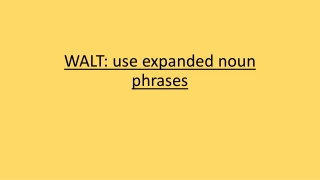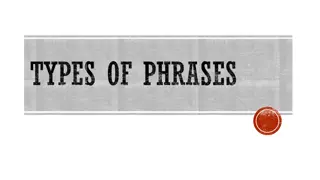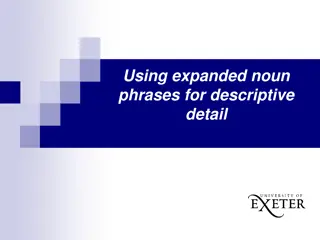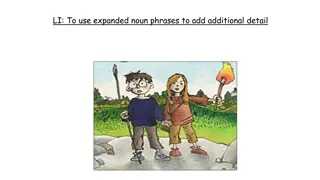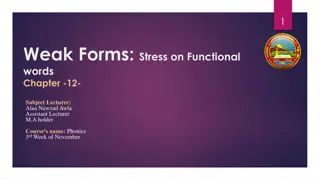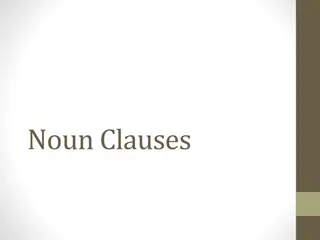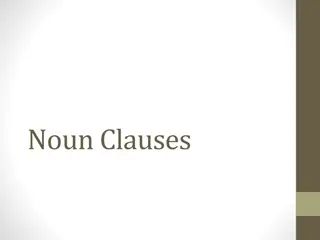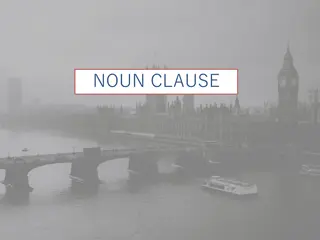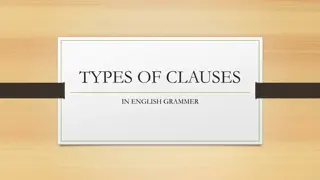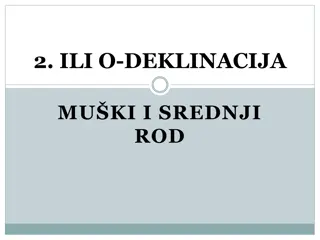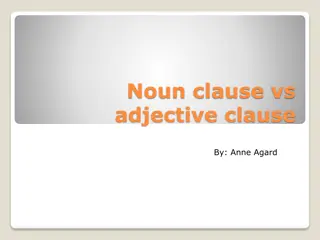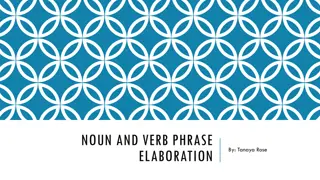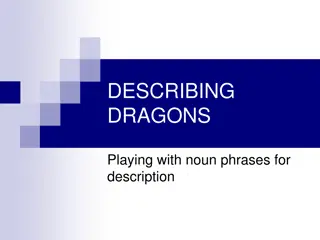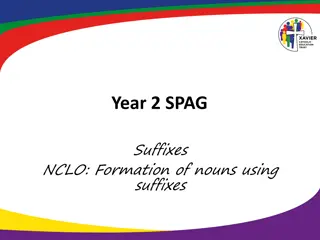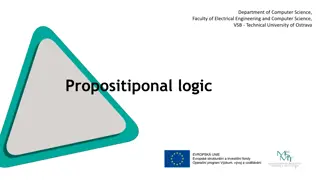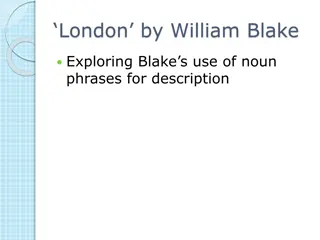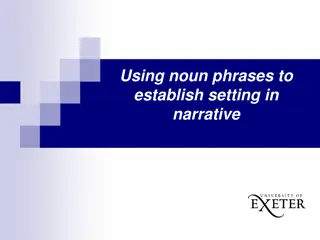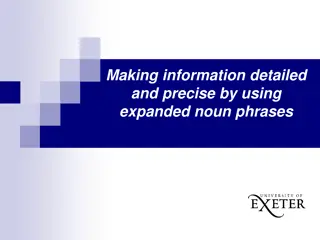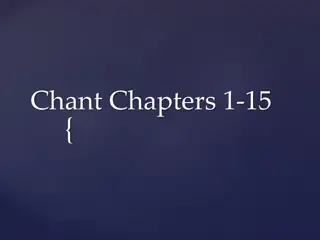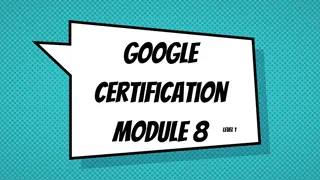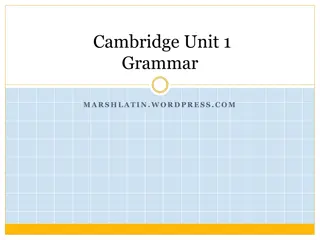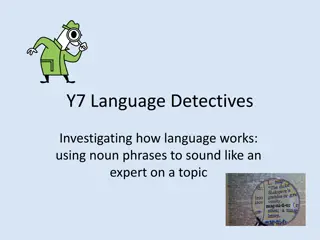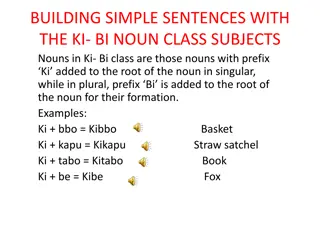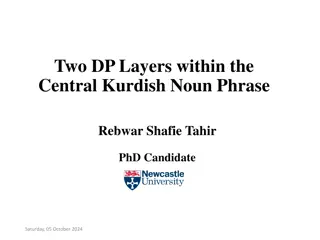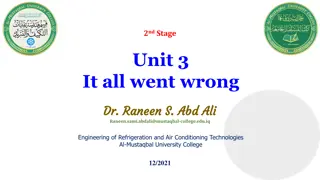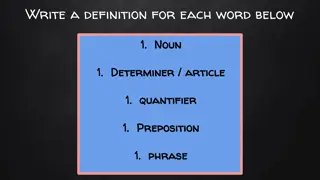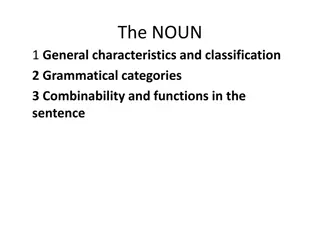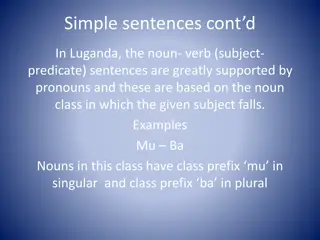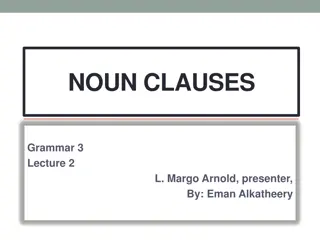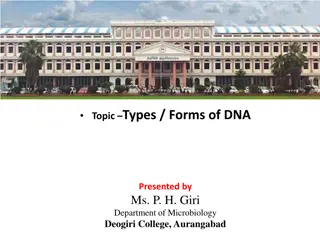WALT: use expanded noun phrases
Write expanded noun phrases using adjectives to describe Macbeth's appearance, characteristics, and surroundings. Enhance your writing skills with vivid details.
0 views • 5 slides
Understanding Different Types of Phrases in English Grammar
Explore the various types of phrases in English grammar, including noun phrases and adjectival phrases. Learn how modifiers can come before or after the noun in a phrase, and practice identifying these phrases in sentences. Enhance your understanding of grammar with clear examples and explanations.
1 views • 12 slides
Exploring Descriptive Detail Through Expanded Noun Phrases
Delve into the art of using expanded noun phrases for descriptive richness in writing, as showcased through authentic texts and engaging discussions. Uncover how these linguistic choices bring life to descriptions, enhance imagery, and spark creativity in readers' minds.
0 views • 6 slides
Enhancing Descriptions with Expanded Noun Phrases
Learn how to transform simple noun phrases into detailed descriptions by adding adjectives to create expanded noun phrases. Explore examples and engage in an activity to practice using expanded noun phrases to describe characters effectively.
0 views • 6 slides
Understanding Strong and Weak Forms in English Pronunciation
Exploring the concept of strong and weak forms in English pronunciation, this content discusses the importance of using weak forms in speech, the rules of occurrence of strong forms, and how to recognize the position of weak forms. Examples and explanations illustrate how function words are weakened
1 views • 25 slides
Understanding Noun Clauses: Examples and Usage
A clause is a group of words with a subject and a verb, while a phrase lacks a subject and verb. Noun clauses, which function as nouns, can be subjects, objects of verbs or prepositions, and complements. They often begin with question words like what, when, or why. Examples illustrate their usage in
2 views • 49 slides
Understanding Noun Clauses in English Grammar
A clause is a group of words with a subject and a verb, while a phrase lacks one. Independent clauses can stand alone, while dependent clauses cannot. Noun clauses function as nouns in a sentence, serving different roles like subjects, objects, prepositional objects, and complements. They can start
1 views • 49 slides
Understanding Adjectivals in Noun Phrases: A Comprehensive Guide
Adjectivals, including determiners, adjectives, and nouns, play crucial roles in modifying nouns within noun phrases. This guide explores the different types of adjectivals, their positions within a phrase, the use of pre-headword modifiers such as determiners, and the order of adjectives and nouns.
1 views • 40 slides
Understanding Noun Clauses in English Grammar
A clause is a group of words with a subject and verb, while a phrase lacks one. Noun clauses, functioning as nouns, serve various roles in sentences. They can be subjects, objects of verbs/prepositions, or complements. Starting with question words like what, when, or why, these clauses mirror statem
0 views • 49 slides
Understanding Noun Clauses and Their Functions
A clause is a group of words containing a subject and predicate forming part of a sentence. Noun clauses act as nouns in a sentence and can function in various ways, such as being the subject or object of a verb, participle, or preposition. They are identified by asking "who" or "what" questions and
0 views • 23 slides
Present Perfect for Giving News: Verb-Noun Collocations and Usage
Study materials on using the Present Perfect tense for sharing news with just, yet, and already. Practice exercises in verb-noun collocations and identifying incorrect words. Explore examples of news messages and answer related questions. Learn how to express events that are connected to the present
1 views • 5 slides
Understanding Types of Clauses in English Grammar
A clause is a fundamental unit of a sentence, comprising a subject and predicate. Learning about the different types of clauses - Independent, Dependent, Relative, and Noun clauses - helps in enhancing grammar skills and sentence structure understanding. Independent clauses stand alone as complete s
2 views • 11 slides
Noun Declensions in Latin - Rules and Examples
Explore the declensions of nouns in Latin for the second declension, including masculine and neuter genders. Learn about the endings for singular and plural forms, along with specific rules for each gender. Dive into the differences between masculine and neuter noun declensions with detailed explana
0 views • 7 slides
Understanding Adjective Clauses and Noun Clauses in English Grammar
Learn the key differences between adjective clauses and noun clauses in English grammar. Adjective clauses describe nouns, while noun clauses take the place of a noun in a sentence, serving as either the subject or object of a verb. Discover how to identify and use these clauses effectively through
0 views • 10 slides
Understanding Grammatical Development in Speech-Language Pathology
Explore a broader perspective of grammatical development in speech-language pathology focusing on noun and verb phrase elaboration. Learn about identifying and elaborating noun phrases, substitution tests, and the elements of an elaborated noun phrase. Gain insights into clinical approaches and lang
0 views • 28 slides
Mastering Noun Phrases for Vivid Descriptions
Explore the art of crafting compelling noun phrases to vividly describe dragons and other fantastical creatures. Learn techniques such as using determiners, hyphenated adjectives, prepositional phrases, similes, and relative pronouns to create imaginative and detailed descriptions. Elevate your writ
0 views • 15 slides
Exploring Noun Formation with Suffixes - Year 2 SPAG Activities
Dive into the world of noun formation using suffixes in this engaging Year 2 SPAG lesson. Discover how suffixes transform verbs into nouns, identify job titles by adding the suffix "-er" to action words, understand emotions through "-ment" suffixes, and recognize qualities with "-ness" endings. Enga
0 views • 10 slides
Understanding Normal Forms in Propositional Logic
Explore the concept of normal forms in propositional logic, where each formula has a unique truth-value function. Learn about equivalence of formulas, determining normal forms, and canonic forms like Disjunctive Normal Form (DNF) and Conjunctive Normal Form (CNF). Discover how to find canonic forms
1 views • 22 slides
Analysis of William Blake's Use of Noun Phrases in "London
Exploring William Blake's poem "London," this analysis focuses on the use of noun phrases to describe people, places, objects, and emotions. By examining the nouns chosen by Blake and the patterns they form, we gain insight into the vivid and evocative imagery he creates. The expanded noun phrases i
1 views • 4 slides
Exploring Setting Through Noun Phrases in Narrative Descriptions
Establishing setting in narrative through the use of descriptive noun phrases is crucial for creating a vivid and immersive atmosphere. By carefully selecting and arranging nouns, authors can evoke specific moods and engage readers in a detailed visual experience. This approach enhances the overall
1 views • 6 slides
Enhancing Writing Through Detailed Noun Phrases
Explore the LEAD principles for connecting grammar with meaning and rhetorical effect in writing. Authentic texts are utilized to engage learners in deep metalinguistic learning. An interactive activity challenges readers to match descriptions with marine creatures based on detailed noun phrases. De
1 views • 6 slides
Vocabulary Practice: Context Clues and Noun Forms
Enhance your vocabulary skills with this practice set. Learn to determine word meanings through context clues and identify correct noun forms. Sharpen your language understanding by solving exercises on various words and their meanings in different contexts.
0 views • 25 slides
Vocabulary Lesson on Actions and Nouns
Explore various action words and corresponding noun forms in this vocabulary lesson. Learn about verbs like groom, share, and flap, along with their noun counterparts such as calf, cushion, and claw. Expand your understanding of language by discovering how animals and humans use these words in every
0 views • 24 slides
Greek Language Verb Forms and Noun Declensions Overview
Explore verb forms and noun declensions in the Greek language through detailed images and descriptions. Learn about present active and middle/passive indicative verbs, shape of the future, imperfect active paradigm, and more. Practice pronouns and delve into the structure of the Greek language effor
0 views • 24 slides
English Grammar Final Exam Review
Subordinate clauses, nominal phrases, and noun clauses are identified within the context of adjectival, adverbial, or nominal functions. The exercise covers recognizing nominal clauses following prepositions as noun phrases, pronouns, gerunds, or nominal clauses. Additionally, combining sentences us
0 views • 17 slides
Google Forms - Creating Surveys, Quizzes, and More
In this comprehensive guide, learn how to create surveys, quizzes, set preferences, use different question types, embed videos, add images, collaborate on forms, and create Sheets from form responses in Google Forms. Follow step-by-step instructions to enhance your Google Forms skills and become pro
0 views • 13 slides
Understanding Greek Noun Inflection and Cases
Explore the intricacies of Greek noun inflection, including cases like nominative, subjective, genitive, possessive, dative, and accusative. Learn about lexical forms, gender, number, and how to identify cases in Greek nouns. Dive into examples from John 3:16 and Mark 2:2 to see these concepts in ac
0 views • 36 slides
Understanding Grammar Terms in Business Translation (ENB4202)
Explore key grammar terms such as action verb, adjective, adverb, article, clause, coordinating conjunction, dependent clause, gerund, linking verb, noun, noun phrase, object, phrase, preposition, pronoun, and subject in the context of business translation. Learn their definitions, functions, and ex
0 views • 14 slides
Understanding Latin Noun Cases and Declensions
Explore the use and distinctions of Latin noun cases (Nominative, Genitive, Dative, Accusative, Ablative), along with the concept of declensions, genders, numbers, and cases. Learn how to determine the declension, gender, number, and case of a Latin noun through its endings, and delve into examples
0 views • 23 slides
Mastering Noun Phrases for Expertise in Language
Explore the power of crafting precise noun phrases to elevate your expertise on any topic. Unveil the secrets of using nouns strategically to convey depth and authority in your writing. Dive into the world of language detectives and uncover the nuances of language through the lens of noun phrases. E
0 views • 10 slides
Constructing Sentences with Ki-Bi Noun Class
Learn how to form simple sentences using nouns in the Ki-Bi class. Discover how to create plural nouns and construct subject-predicate sentences with the appropriate prefixes. Explore examples and rules for transforming singular nouns into plural forms. Master the use of Ki and Bi prefixes for effec
0 views • 5 slides
Understanding Word Classes and Noun Functions in Grammar
Explore the concept of word classes such as open class and minimum free form, structural vs traditional grammar, count abstract vs concrete nouns, noun phrase extensions, properties of nouns, and noun functions in language. Enhance your understanding of adjectives, determiners, prepositions, and var
0 views • 28 slides
Understanding Definiteness in Central Kurdish Noun Phrases
The exploration of two DP layers within the Central Kurdish noun phrase reveals the application of functional elements to express definiteness. Examining the role of D-category and the morpheme -e sheds light on the markers of definiteness in CK, providing insights into prenominal demonstratives and
0 views • 20 slides
Engineering of Refrigeration and Air Conditioning Technologies at Al-Mustaqbal University College
Explore Unit 3 of the Refrigeration and Air Conditioning program at Al-Mustaqbal University College, focusing on irregular verbs, noun-verb communication, noun-adjective pairs, and positive-negative opposites. Enhance your knowledge in the field with practical examples and engaging content.
0 views • 8 slides
Understanding Noun Phrases: Definitions and Examples
Noun phrases are essential components of language that consist of a noun and other words that describe or modify it. This article provides definitions for key terms related to noun phrases, such as nouns, determiners, quantifiers, prepositions, adjectives, and adverbs. Examples and images help illus
0 views • 12 slides
Understanding the Noun: Characteristics, Classification, and Functions
The noun is a fundamental part of speech expressing various concepts such as names of objects, living beings, places, materials, processes, and more. It is characterized by semantic features, formal criteria including derivational features, grammatical categories like number and gender, and combinab
0 views • 18 slides
Luganda Noun-Verb Sentences and Pronouns
Explore Luganda noun-verb sentence structures supported by pronouns based on noun classes, specifically Mu-Ba and Mu-Mi, with examples showcasing singular and plural forms. Learn how to construct simple sentences using various nouns in these classes.
0 views • 6 slides
Changes in 1099 Withholding Forms for CY2022
Explore the latest updates in 1099 withholding forms for CY2022, including changes in IRS forms, PeopleSoft withholding modifications, and additional considerations for withholding processes. Learn about the new requirements and enhancements impacting 1099-MISC and 1099-NEC forms, such as FATCA comp
0 views • 39 slides
Understanding Noun Clauses in Grammar
Noun clauses are dependent clauses that act as nouns in sentences, serving as subjects, verb objects, prepositional objects, and complements. They should not be separated from main clauses with punctuation. Noun clauses can appear at the beginning of a sentence or after certain nouns, adjectives, an
0 views • 77 slides
Understanding Different Forms of DNA Structures
DNA can exist in various forms such as single-stranded, double-stranded, and mixed forms. The primary, secondary, and tertiary/quaternary structures play crucial roles in determining the overall structure of DNA. Forms like A-DNA and B-DNA have distinct characteristics and are commonly found in diff
0 views • 57 slides
